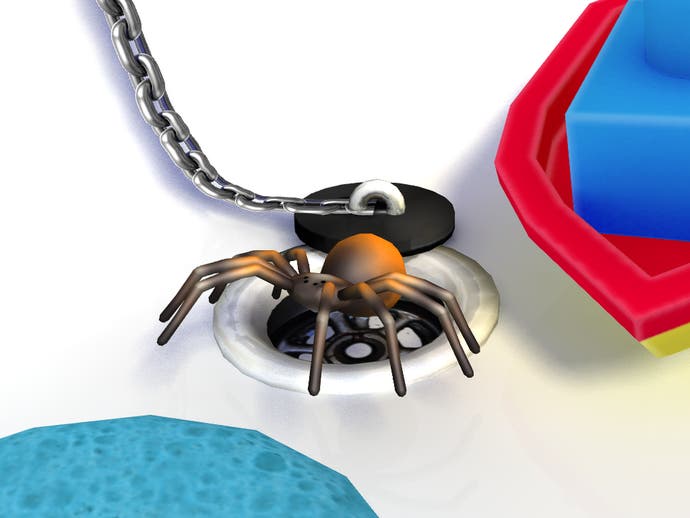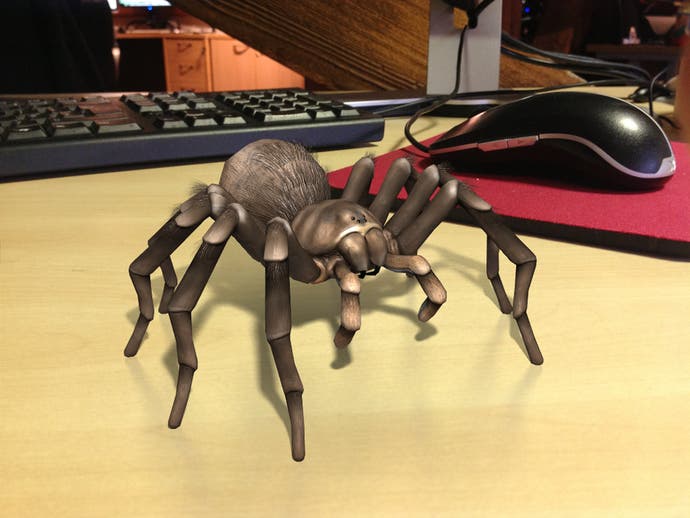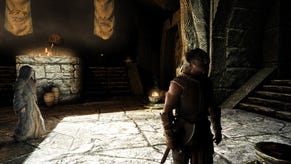Spider senseless: The plight of the arachnophobic video game player
How players are using games to address and overcome their fear.
Spiders weren't always an issue for modder Cory Ferrier. Before the age of seven, they hadn't bothered him whatsoever, until an unfortunate encounter at the zoo kickstarted his condition. He's now in his late teens and although not something he'd consider 'crippling', his fear extends to similar insects like crickets and cockroaches. As he suggests, the onset of his phobia has negatively impacted his enjoyment of video games - particularly against the increasingly realistic depictions modern technology throws at him. Role-playing games are playgrounds of constant torment.
Eurogamer contributor and self-confessed spider hater Richard Cobbett wrote recently about spiders in RPGs for Rock, Paper, Shotgun, pointing out how the genre has a hapless tendency to populate its dungeons and castles and keeps with aggressive tarantulas. Although purposefully playful in his tone, Richard rightly identifies the fact that these evil arachnids are often unnecessarily shoehorned into their settings - their size posing considerable challenge for some players.
For some others, however, the inclusion of spiders in any setting - as friend or foe - renders certain games completely unplayable. ""It depends on the game," explains arachnophobic Ferrier. "If it's first-person, giant spiders in your face, that sort of thing, I can't play it. [The giant] spiders in Skyrim pretty much stopped me from playing. And if a game doesn't have decent modding tools it's doubly hard. Take Metro: Last Light - here, spiders will be jumping off the ceilings and, no, I can't even touch that."

Determined to avoid yet another game spoiled at the hands of his phobia, Ferrier turned his modding talents towards Skyrim, creating 'Insects Begone' in 2012 for the Skyrim Nexus modding community. By swapping spiders for bears - and even the native Chaurus insects for rats - those averse to the scuttling movements of multi-legged mites now stand a better chance of enjoying Bethesda's sandbox RPG. Whereas many other mods borrow existing resources from their primary inspiration, Insects Begone completely replaces the spider model's textures, allowing a seamless transition.
Working on his own, Ferrier admits creating something for himself and creating something for others to enjoy became two very separate things early on in development - the latter proving particularly challenging courtesy of a particularly tricky and temperamental installer package. But after just two and a half years of circulation, Insects Begone has accrued well over 21,000 downloads, over 12,000 unique downloads, and over a thousand endorsements, at the time of writing. Seeing a discourse unfold about phobias on the forums, says Ferrier, justifies the hard work.
"It was a lot of effort making this, but honestly the responses make it worth it," he says. "People who really couldn't play the game before now can. There's always people asking questions. Some of them doubt that it'll work, but their reaction is great once they download it. I think seeing conversations about [phobias] is great because making the installer was tough, and the endorsements it's received are actually pretty insane. It's being used, so that's the main thing although I am very shocked at just how many are using it - I'm glad I could help people out there!"
By chance, 2012 was also the year that Virtually Free - a London-based app developer - opened its doors, taking its first steps towards helping iOS users overcome arachnophobia, via the process of systematic desensitisation. Digitising behavioural therapy programmes may sound complex in theory, but clinical psychiatrists Russell Green and Andres Fonseca started out with one fairly straightforward aim: to provide a service which would grant the public better access to psychological help. They then sought the help of game development veteran Richard Flower and, by virtue of their combined professional knowledge and expertise, Virtually Free was born.

Phobia Free, the team's debut title, utilises a seven-step programme that firstly introduces players to cartoon spiders, before working through a hierarchy of difficulty levels which culminates in the player getting to grips with an augmented reality tarantula. "Basically the game mimics what we do in the real world," explains Green. "[In the clinic] we teach patients ways to manage and control their anxiety, and then we gradually expose them to the thing that they're frightened of. What we need to do is stay in that situation until their anxiety comes down and then move onto the next step.
"As you gradually build that up, it trains the brain and is very effective for what we call 'simple' phobias - where you're fearful of an animal or heights, for example - and if people do the process once, they generally don't need a top up. Phobia Free is the virtual version of this process. I myself used to be terrified of spiders."
Herein lay Green's biggest problem: his desire to extend professionally accredited, accessible and engaging psychological treatment into people's personal spaces was counterbalanced by his own phobia. Naturally, Green took on the surrogate role of lead QA tester but admits struggling with the fact that keying "arachnophobia" into Google throws up quite so many pictures of tarantulas. Nonetheless, he persevered and as a result overcame his fear - taking part in a sponsored full run-through of the app for Anxiety UK, topped off with him holding a real life house spider.
In the case of Phobia Free, the combination of clinical psychologist and experienced game developer making an app about phobias isn't quite as incongruous as it may at first sound - regardless of the banter Green and Flower exchange in this vein during our Skype chat. Of course, Flower knows the prerequisites of what makes an entertaining end product, but aside from his professional input from a psychiatry perspective, Green's observations as an arachnophobic - like the exact movement which triggers fear, for example - proved invaluable.
But designing an app to help arachnophobia seems like a far cry from developing a AAA video game. I ask Flower the differences from a design perspective in crafting what is essentially occupational therapy, compared to a more traditional game. "I think there's probably more similarities than not," he says. "The thing about video games is that they're very engaging so you need to make an engaging game. I think the interesting thing was that we took something which was essentially a simple concept, which is systematic exposure of increasing scenarios, and just making those fun.

"By having to tap the spider just behind its abdomen to make it move meant that you were naturally focussed on the animal in question, so some of these things dropped out quite naturally in the design process. We didn't really find it a huge challenge. I think it was interesting to get the background on what worked and why it works and once you've got that in mind you use general video game design skills to create the product."
So far, according to Green, Phobia Free has fared well on the App Store, and endearing personal testimonials - such as parents tackling their phobia alongside their children - has made the journey worthwhile. That said, Green does point out that given the nature of Phobia Free, and the associated stigma around phobias, it's received less personal reviews than might've been expected - something Green suggests could be down to embarrassment on the users' part. Interestingly, two of the Insects Begone users I spoke to following my conversation with Cory Ferrier said they'd happily share their experiences, but wished to remain anonymous as they weren't keen on others they hadn't met knowing about their phobia.
Before the Insects Begone mod, one user said, he couldn't touch games with spiders. He spoke of how he'd search games alongside the tag "spider" prior to release, knowing that if anything close to resembling an arachnid came back he'd be forced to steer clear. Another user spoke of a "terrifying" fear of spiders in reality, but found that slaying them in-game sometimes proved therapeutic - even if Insects Begone had made things much easier overall.
Ferrier admits that he has no desire to see the creative visions of development teams in any way stifled, but suggests that if he's able to tackle the issues faced by common phobias, then perhaps developers could make more considerations at the design phase such as as 'toggle on/off button', or a feature to that effect. Green hopes the doctors of the future will prescribe apps in the same way that they do drugs. For him, face-to-face therapy is too expensive and logistically unfeasible. For Ferrier, he'd simply appreciate people viewed phobias with more deference and sincerity.
"I've noticed that sometimes, someone might see a mod like this that replaces spiders etc., and they don't take it seriously," says Ferrier. "I guess they might think it's funny or stupid or whatever. The thing is, if people were to look at it from a different perspective: phobia means irrational fear, so yeah, it is stupid, it is silly that I have to do this, but at the same time I still have to do this - otherwise I can't play the game. So I just hope people might be more understanding, I guess that's my closing thought."









